Security Risk & Compliance Service Overview
Security risk and compliance management is a set of practices and processes that organizations use to identify, assess, and mitigate security risks while ensuring that they adhere to relevant laws, regulations, and industry standards. This approach is crucial for maintaining the security of an organization’s data, systems, and operations, as well as for demonstrating compliance with legal and regulatory requirements. Here’s a closer look at security risk and compliance and why you should implement it in your enterprise:
Risk Assessment
Identify potential security risks and vulnerabilities within your organization's IT infrastructure, processes, and data.
Risk Analysis
Evaluate the potential impact and likelihood of these risks to prioritize them effectively.
Risk Mitigation
Implement security controls and measures to reduce or eliminate identified risks.
Continuous Monitoring
Regularly assess and update your security posture to adapt to changing threats and vulnerabilities.
Internal Policies
Establish and enforce internal security policies and procedures that align with legal and regulatory requirements and industry standards.
Industry Standards
Adhere to industry-specific standards and best practices, such as ISO 27001 for information security management, NIST Cybersecurity Framework, or CIS Controls.
Regulatory Compliance
Ensure that your organization complies with relevant laws and regulations that pertain to your industry and geographic location. Examples include GDPR for data privacy in Europe, HIPAA for healthcare data, and PCI DSS for payment card information.
Why You Should Implement Security Risk and Compliance Management in Your Enterprise:
Security risk management helps you identify and address potential vulnerabilities and threats before they can be exploited, reducing the likelihood and impact of security incidents.
Compliance management ensures that sensitive data is handled and protected appropriately, reducing the risk of data breaches and associated legal and reputational consequences.
Some insurance providers may offer better rates or coverage to organizations with strong security risk management and compliance programs.
A comprehensive security risk management program helps ensure business continuity by reducing the risk of disruptions caused by cyber incidents.
A strong security risk and compliance posture demonstrates to customers, partners, and stakeholders that you take data security seriously, enhancing your reputation and trustworthiness.
By addressing security risks, you protect valuable intellectual property and trade secrets from theft or compromise.
Effective security risk management ensures you are better prepared to respond to security incidents and minimize damage in case of a breach.
A strong security risk and compliance posture demonstrates to customers, partners, and stakeholders that you take data security seriously, enhancing your reputation and trustworthiness.
Security risk and compliance management can lead to improved operational efficiency by streamlining processes, reducing security incidents, and minimizing downtime.
Many customers prefer to do business with organizations that demonstrate strong security practices and compliance, giving you a competitive edge in the market.
In summary, implementing security risk and compliance management in your enterprise is essential for minimizing risks, protecting data, complying with legal requirements, enhancing your reputation, and maintaining a competitive advantage in today’s digital business environment. It is a proactive approach to managing cybersecurity risks and demonstrating your commitment to data security and privacy.


